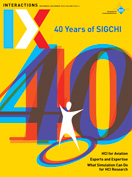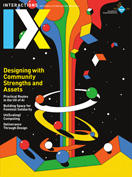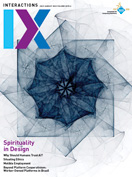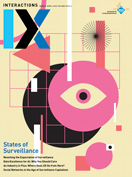Table of Contents
VOLUME XXIX.2 March - April 2022
-
WELCOME
-
States of surveillance
Kandrea Wade, Alex Taylor, Daniela Rosner, Mikael Wiberg
You are what you eat" is a common expression linking eating habits to health. Adapting this for the Internet era, we might say, "You are what you click on." In short, the seemingly private and individual actions we take online generate digital traces, and these traces in turn are…
-
-
Demo Hour
-
Elevate: A large-scale walkable pin-array display
Seungwoo Je, Kongpyung Moon, Hyunseung Lim, Shan-Yuan Teng, Jas Brooks, Pedro Lopes, Andrea Bianchi

Current head-mounted displays enable users to explore virtual worlds by simply walking through them (i.e., real-walking VR). This led researchers to create haptic displays that can also simulate different types of elevation shapes. However, existing shape-changing floors are limited by their tabletop scale and the coarse resolution of the…
-
Prototype of a force-feedback tool for mixed reality applications
Ian Gonsher, Zhenhong Lei

This prototype demonstrates the viability of manipulating both physical and virtual objects with the same tool in order to maintain object permanence across both modes of interaction. Using oppositional force feedback, provided by a servo, and an augmented visual interface, provided by the user's smartphone, this tool simulates the…
-
-
What are you reading?
-
What are you reading? Onur Arslan
Onur Arslan

I am waiting for the next hearing in front of the courtroom door. A man approaches me, politely asking if I am a lawyer or a journalist. My answer is short: "Ph.D. researcher. I am working on how the creation of digital evidence constructs terrorism narratives in Turkey." Before…
-
-
Blog@IX
-
We need to get rid of significance in A/B testing, seriously!
Maximilian Speicher
In my previous job, I was responsible for all A/B testing in an e-commerce department. We worked with an external partner and took care of the whole package—from generating hypotheses to developing the tests to providing a report of the results. Those reports were presented to a variety of…
-
-
Exhibit X
-
Sleeping eyes
Sojung Bahng

I worked with South Korean media artist Sungeun Lee to create the interactive VR artwork Sleeping Eyes. We used VR as an artistic medium to explore Lee's symptoms of narcolepsy and provoke reflection on the boundary between dreams and reality. We applied nonlinear narrative and gamification techniques to enable…
-
-
Columns
-
Resetting the expectation of surveillance
Jonathan Bean

In an absentminded moment the other day, I zoomed in on Google Maps to look at the parking lot of the Ikea store in Phoenix, about two hours from my home in southern Arizona. Living in the midst of a pandemic in one of the states with the most…
-
Seeing like a state (of surveillance)
Jaz Choi, Roopa Vasudevan

We met in Aarhus, Denmark, in the summer of 2019. Considering where we live physically—Roopa in Lenapehoking (Philadelphia) and Jaz in the Kulin Nation (Melbourne)—it was an odd place for us to meet. It was an odd time, too. In hindsight, it was like how we remember our last…
-
-
Making/breaking
-
Designing unrest
Tom Bieling, Frieder Bohaumilitzky, Anke Haarmann, Torben Körschkes
_Frieder_Bohaumilitzky.jpg)
The shaping of our world is an ongoing process of negotiation and dissent, a state of perpetual unrest. How do we—as designers, as a society—move in and through (spaces of) unrest? A starting point for this question is the project Metapolitisches Hüpfen (Metapolitical Bouncing; Figure 1) by Frieder Bohaumilitzky,…
-
-
Forums
-
What the facebook files tell us about racial capitalism
Sareeta Amrute

On November 12, 2021, the public pension fund for the state employees of Ohio filed a class action lawsuit with the Securities and Exchange Commission alleging that they purchased Class A Facebook stock at artificially inflated prices. According to the suit, these inflated prices were the result of Facebook's…
-
Traversing the insider’s path toward equitable research practices for migrants
Nana Dankwa

The journey matters. To me, this means valuing the path, as a human being and as a researcher, as much as the goal or destination. In my research journey, I engage people with migrant backgrounds living in Germany, like myself. The goal is to design platforms that empower migrants.…
-
Data excellence for AI: Why should you care?
Lora Aroyo, Matthew Lease, Praveen Paritosh, Mike Schaekermann

The efficacy of machine learning (ML) models depends on both algorithms and data. Training data defines what we want our models to learn, and testing data provides the means by which their empirical progress is measured. Benchmark datasets define the entire world within which models exist and operate, yet…
-
‘Zombies for their profit’:Social networks in the age of surveillance capitalism
Jana Fedtke, Mohammed Ibahrine, Yuting Wang, Bouziane Zaid

Social networks, search engines, and analytics through algorithms have gradually become a part of our digital existence. As people navigate the digital world in their work lives and private spheres, more and more data is collected, stored, and analyzed. This increasing datafication has become a concern with regard to…
-
Toward a worker-centered analysis in fighting disinformation: Global south perspectives
Jonathan Ong

In the Philippines, content moderators, otherwise known as "digital janitors," work tirelessly to scrub filth, gore, and lewd photos off our social media. The country is one of the biggest hubs of outsourced content moderation work, an outgrowth of its call center industry—the largest in the world [1]. Unlike…
-
All equation, no human: The myopia of AI models in low-resource areas
Nithya Sambasivan

AI research and practice today places novel mathematical algorithms—models—at center stage, celebrating new model architectures and state-of-the-art performance. Although algorithms are trained over datasets and input by human experts, the overt emphasis on model performance ignores these aspects. The model emphasis has led to criticism from within the community,…
-
-
Space
-
MarginalizedAadhaar: India’s Aadhaar biometric ID and mass surveillance
Subhashish Panigrahi

Aadhaar was established in 2009 as a national digital ID system to ensure the delivery of public welfare and essential services. The 12-digit Aadhaar number, intended to be unique to every resident, is created upon enrollment, which mandates the collection of biometric data (iris scan, fingerprint, and photograph) and…
-
-
Dialogues
-
The current state of surveillance: How will society be affected by future advancements in tech?
Janelle Mason

During the pandemic, our dependence on technology has increased more than ever. We use technology to attend school, go to work, communicate with family and friends, move supplies and merchandise, streamline medical processes, and much more. Technology is used to bring a level of convenience to our everyday lives…
-
Toward everyday negotiation and resistance under data-driven surveillance
Alex Lu

As sociologist David Lyon describes, we are now living in a "surveillance society" where surveillance has bled into every aspect of our daily activities, from macro-level Covid-19 contact tracing to micro-level personal health data self-tracking. More than ever, our ways of feeling, being, and living have been quantified, collected,…
-
From data to physical artifact: Challenges and opportunities for designing physical data artifacts
Kim Sauvé, Steven Houben

We are in the midst of a data revolution. Large amounts of data can be collected about ourselves and our environment. Modern technologies such as wearables, sensors, and crowdsourced tools are revolutionizing the way datasets can be accessed and used by larger audiences than ever. This availability of data…
-
Design for dementia: A call from the health sciences
Clara Berridge, Anne Turner, Oleg Zaslavsky, Carolyn Parsey

We are four dementia researchers from different clinical corners of the health sciences (social work, public health, nursing, and neurology). We develop online interventions for older adults living with dementia and want to communicate to HCI researchers the need to address key questions of design for this population, made…
-
Digital dreams have become nightmares: UX for ethical technology use
Ronald Baecker

Digital technologies are essential for learning, health, politics, and commerce. We have innovative products and greater control over the universe. Dangerous physical labor is done by robots. Computational medicine lengthens our life span. And tech supports collaboration and community, essential during the pandemic. Ethical technology use has been expanded…
-
An industry in flux: Where does UX go from here?
Craig MacDonald, Emma Rose, Cynthia Putnam

Working in UX can sometimes feel like climbing a mountain in a snowstorm. Just getting started is a daunting task; with so many things to learn and so many ways to learn them, where does one even begin? Then, just when you think you've finally got a solid footing,…
-



